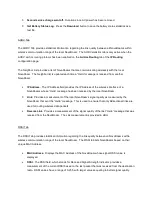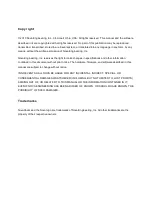
•
Redirect messages sent. Total number of redirect messages sent. A redirect is sent when an
alternate route for the datagram is selected.
•
Echo request messages sent. Total number of echo requests sent. An echo request causes
the receiving radio to send an echo reply message back to the originating radio. Echo requests
are typically generated by a “Ping” application.
•
Echo reply messages sent. Total number of echo replies sent. An echo reply is sent to respond
to an echo request. Echo replies are typically generated by a “Ping” application.
•
Timestamp request messages sent. Total number of timestamp requests sent. A timestamp
request causes the radio to send a timestamp reply to the originating radio.
•
Timestamp reply messages sent. Total number of timestamp replies sent. A timestamp reply is
sent in response to a timestamp request. Timestamp replies and requests measure the
transmission speed of datagrams on a network.
•
Address mask request messages sent. Total number of address mask requests sent. An
address mask request is sent to determine the number of bits in the subnet mask for the
destination’s Ethernet subnet.
•
Address mask reply messages sent. Total number of address mask responses sent. An
address mask response is sent in response to an address mask request.
UDP Tab
The UDP Tab provides the following statistical information regarding the User Datagram Protocol. UDP is
generated by the application layer and uses ports to facilitate application-to-application communication
•
Datagrams received. Total number of UDP datagrams successfully received.
•
Datagrams destined for unknown ports. Total number of received UDP datagrams with
unknown destination ports.
•
Datagrams discarded due to format error. Total number of UDP datagrams which were not
delivered due to format errors.
•
Datagrams sent. Total number of UDP datagrams sent.
IP Tab
The IP Tab provides the following statistical information regarding the Internet Protocol.





































